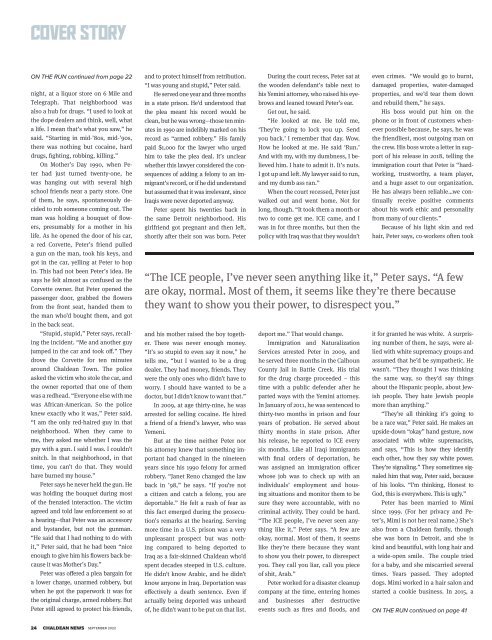You also want an ePaper? Increase the reach of your titles
YUMPU automatically turns print PDFs into web optimized ePapers that Google loves.
COVER STORY<br />
ON THE RUN continued from page 22<br />
night, at a liquor store on 6 Mile and<br />
Telegraph. That neighborhood was<br />
also a hub for drugs. “I used to look at<br />
the dope dealers and think, well, what<br />
a life. I mean that’s what you saw,” he<br />
said. “Starting in mid-’80s, mid-’90s,<br />
there was nothing but cocaine, hard<br />
drugs, fighting, robbing, killing.”<br />
On Mother’s Day 1990, when Peter<br />
had just turned twenty-one, he<br />
was hanging out with several high<br />
school friends near a party store. One<br />
of them, he says, spontaneously decided<br />
to rob someone coming out. The<br />
man was holding a bouquet of flowers,<br />
presumably for a mother in his<br />
life. As he opened the door of his car,<br />
a red Corvette, Peter’s friend pulled<br />
a gun on the man, took his keys, and<br />
got in the car, yelling at Peter to hop<br />
in. This had not been Peter’s idea. He<br />
says he felt almost as confused as the<br />
Corvette owner. But Peter opened the<br />
passenger door, grabbed the flowers<br />
from the front seat, handed them to<br />
the man who’d bought them, and got<br />
in the back seat.<br />
“Stupid, stupid,” Peter says, recalling<br />
the incident. “Me and another guy<br />
jumped in the car and took off.” They<br />
drove the Corvette for ten minutes<br />
around Chaldean Town. The police<br />
asked the victim who stole the car, and<br />
the owner reported that one of them<br />
was a redhead. “Everyone else with me<br />
was African-American. So the police<br />
knew exactly who it was,” Peter said.<br />
“I am the only red-haired guy in that<br />
neighborhood. When they came to<br />
me, they asked me whether I was the<br />
guy with a gun. I said I was. I couldn’t<br />
snitch. In that neighborhood, in that<br />
time, you can’t do that. They would<br />
have burned my house.”<br />
Peter says he never held the gun. He<br />
was holding the bouquet during most<br />
of the frenzied interaction. The victim<br />
agreed and told law enforcement so at<br />
a hearing—that Peter was an accessory<br />
and bystander, but not the gunman.<br />
“He said that I had nothing to do with<br />
it,” Peter said, that he had been “nice<br />
enough to give him his flowers back because<br />
it was Mother’s Day.”<br />
Peter was offered a plea bargain for<br />
a lower charge, unarmed robbery, but<br />
when he got the paperwork it was for<br />
the original charge, armed robbery. But<br />
Peter still agreed to protect his friends,<br />
and to protect himself from retribution.<br />
“I was young and stupid,” Peter said.<br />
He served one year and three months<br />
in a state prison. He’d understood that<br />
the plea meant his record would be<br />
clean, but he was wrong—those ten minutes<br />
in 1990 are indelibly marked on his<br />
record as “armed robbery.” His family<br />
paid $1,000 for the lawyer who urged<br />
him to take the plea deal. It’s unclear<br />
whether this lawyer considered the consequences<br />
of adding a felony to an immigrant’s<br />
record, or if he did understand<br />
but assumed that it was irrelevant, since<br />
Iraqis were never deported anyway.<br />
Peter spent his twenties back in<br />
the same Detroit neighborhood. His<br />
girlfriend got pregnant and then left,<br />
shortly after their son was born. Peter<br />
and his mother raised the boy together.<br />
There was never enough money.<br />
“It’s so stupid to even say it now,” he<br />
tells me, “but I wanted to be a drug<br />
dealer. They had money, friends. They<br />
were the only ones who didn’t have to<br />
worry. I should have wanted to be a<br />
doctor, but I didn’t know to want that.”<br />
In 2009, at age thirty-nine, he was<br />
arrested for selling cocaine. He hired<br />
a friend of a friend’s lawyer, who was<br />
Yemeni.<br />
But at the time neither Peter nor<br />
his attorney knew that something important<br />
had changed in the nineteen<br />
years since his 1990 felony for armed<br />
robbery. “Janet Reno changed the law<br />
back in ’98,” he says. “If you’re not<br />
a citizen and catch a felony, you are<br />
deportable.” He felt a rush of fear as<br />
this fact emerged during the prosecution’s<br />
remarks at the hearing. Serving<br />
more time in a U.S. prison was a very<br />
unpleasant prospect but was nothing<br />
compared to being deported to<br />
Iraq as a fair-skinned Chaldean who’d<br />
spent decades steeped in U.S. culture.<br />
He didn’t know Arabic, and he didn’t<br />
know anyone in Iraq. Deportation was<br />
effectively a death sentence. Even if<br />
actually being deported was unheard<br />
of, he didn’t want to be put on that list.<br />
During the court recess, Peter sat at<br />
the wooden defendant’s table next to<br />
his Yemini attorney, who raised his eyebrows<br />
and leaned toward Peter’s ear.<br />
Get out, he said.<br />
“He looked at me. He told me,<br />
‘They’re going to lock you up. Send<br />
you back.’ I remember that day. Wow.<br />
How he looked at me. He said ‘Run.’<br />
And with my, with my dumbness, I believed<br />
him. I hate to admit it. It’s nuts.<br />
I got up and left. My lawyer said to run,<br />
and my dumb ass ran.”<br />
When the court recessed, Peter just<br />
walked out and went home. Not for<br />
long, though. “It took them a month or<br />
two to come get me. ICE came, and I<br />
was in for three months, but then the<br />
policy with Iraq was that they wouldn’t<br />
deport me.” That would change.<br />
Immigration and Naturalization<br />
Services arrested Peter in 2009, and<br />
he served three months in the Calhoun<br />
County Jail in Battle Creek. His trial<br />
for the drug charge proceeded – this<br />
time with a public defender after he<br />
parted ways with the Yemini attorney.<br />
In January of 2011, he was sentenced to<br />
thirty-two months in prison and four<br />
years of probation. He served about<br />
thirty months in state prison. After<br />
his release, he reported to ICE every<br />
six months. Like all Iraqi immigrants<br />
with final orders of deportation, he<br />
was assigned an immigration officer<br />
whose job was to check up with an<br />
individuals’ employment and housing<br />
situations and monitor them to be<br />
sure they were accountable, with no<br />
criminal activity. They could be hard.<br />
“The ICE people, I’ve never seen anything<br />
like it,” Peter says. “A few are<br />
okay, normal. Most of them, it seems<br />
like they’re there because they want<br />
to show you their power, to disrespect<br />
you. They call you liar, call you piece<br />
of shit, Arab.”<br />
Peter worked for a disaster cleanup<br />
company at the time, entering homes<br />
and businesses after destructive<br />
events such as fires and floods, and<br />
even crimes. “We would go to burnt,<br />
damaged properties, water-damaged<br />
properties, and we’d tear them down<br />
and rebuild them,” he says.<br />
His boss would put him on the<br />
phone or in front of customers whenever<br />
possible because, he says, he was<br />
the friendliest, most outgoing man on<br />
the crew. His boss wrote a letter in support<br />
of his release in 2018, telling the<br />
immigration court that Peter is “hardworking,<br />
trustworthy, a team player,<br />
and a huge asset to our organization.<br />
He has always been reliable…we continually<br />
receive positive comments<br />
about his work ethic and personality<br />
from many of our clients.”<br />
Because of his light skin and red<br />
hair, Peter says, co-workers often took<br />
“The ICE people, I’ve never seen anything like it,” Peter says. “A few<br />
are okay, normal. Most of them, it seems like they’re there because<br />
they want to show you their power, to disrespect you.”<br />
it for granted he was white. A surprising<br />
number of them, he says, were allied<br />
with white supremacy groups and<br />
assumed that he’d be sympathetic. He<br />
wasn’t. “They thought I was thinking<br />
the same way, so they’d say things<br />
about the Hispanic people, about Jewish<br />
people. They hate Jewish people<br />
more than anything.”<br />
“They’re all thinking it’s going to<br />
be a race war,” Peter said. He makes an<br />
upside-down “okay” hand gesture, now<br />
associated with white supremacists,<br />
and says, “This is how they identify<br />
each other, how they say white power.<br />
They’re signaling.” They sometimes signaled<br />
him that way, Peter said, because<br />
of his looks. “I’m thinking, Honest to<br />
God, this is everywhere. This is ugly.”<br />
Peter has been married to Mimi<br />
since 1999. (For her privacy and Peter’s,<br />
Mimi is not her real name.) She’s<br />
also from a Chaldean family, though<br />
she was born in Detroit, and she is<br />
kind and beautiful, with long hair and<br />
a wide-open smile. The couple tried<br />
for a baby, and she miscarried several<br />
times. Years passed. They adopted<br />
dogs. Mimi worked in a hair salon and<br />
started a cookie business. In 2015, a<br />
ON THE RUN continued on page 41<br />
24 CHALDEAN NEWS <strong>SEPTEMBER</strong> <strong>2022</strong>

















